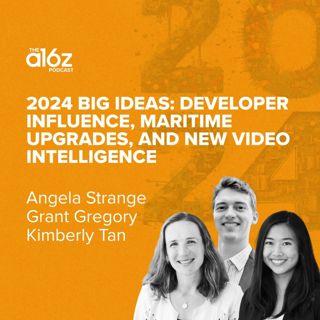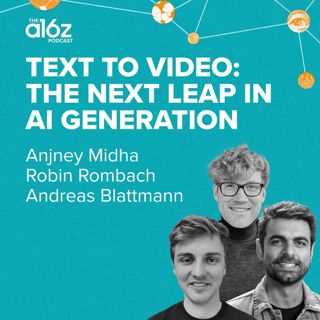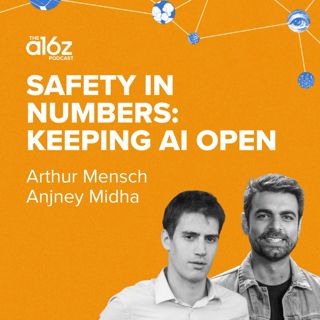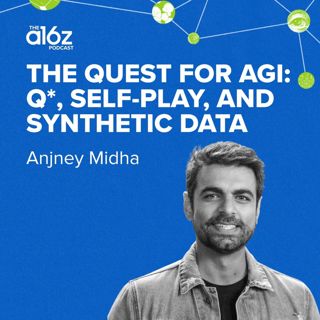
A Year of Unlocks: 2023 In AI, Healthcare, Housing, and More
As we close off 2023, we wanted to revisit some of our favorite episodes from the last year. From AI hardware, to healthcare regulation, to disrupting the world’s largest asset class, to the electrification of nearly everything… there’s something in here for all listeners. Resources: AI Hardware, Explained:https://a16z.simplecast.com/episodes/ai-hardware-explainedChasing Silicon: The Race for GPUs: https://a16z.simplecast.com/episodes/chasing-silicon-the-race-for-gpusThe True Cost of Compute: https://a16z.simplecast.com/episodes/the-cost-of-computeAI Revolution: Disruption, Alignment, and Opportunity: https://a16z.simplecast.com/episodes/ai-revolution-disruption-alignment-and-opportunityThe Robot Lawyer Resistance; https://a16z.simplecast.com/episodes/the-robot-lawyer-resistanceThe Quest for AGI: Q*, Self-Play, and Synthetic Data: https://a16z.simplecast.com/episodes/the-quest-for-agi-q-self-play-and-synthetic-dataThe Road to Autonomous Vehicles: Are We There Yet?: https://a16z.simplecast.com/episodes/the-road-to-autonomous-vehicles-are-we-there-yet-PstZz2G_The Electrification of Everything: From Sky to Sea: https://a16z.simplecast.com/episodes/the-electrification-of-everything-from-sky-to-seaWhen Two Giants Intersect: Healthcare Meets Fintech: https://a16z.simplecast.com/episodes/when-two-giants-intersect-healthcare-meets-fintechSalary Transparency: Clarity or Chaos?: https://a16z.simplecast.com/episodes/salary-transparency-clarity-or-chaosDisrupting the World’s Largest Asset Class with Adam Neumann: https://a16z.simplecast.com/episodes/disrupting-the-worlds-largest-asset-classThe Data Highway Above with Privateer’s Steve Wozniak, Alex Fielding, and Dr. Moriba Jah: https://a16z.simplecast.com/episodes/new-the-data-highway-above-with-privateers-steve-wozniak-alex-fielding-and-dr-moriba-jah Stay Updated: Find a16z on Twitter: https://twitter.com/a16zFind a16z on LinkedIn: https://www.linkedin.com/company/a16zSubscribe on your favorite podcast app: https://a16z.simplecast.com/Follow our host: https://twitter.com/stephsmithioPlease note that the content here is for informational purposes only; should NOT be taken as legal, business, tax, or investment advice or be used to evaluate any investment or security; and is not directed at any investors or potential investors in any a16z fund. a16z and its affiliates may maintain investments in the companies discussed. For more details please see a16z.com/disclosures. Stay Updated:Find a16z on XFind a16z on LinkedInListen to the a16z Show on SpotifyListen to the a16z Show on Apple PodcastsFollow our host: https://twitter.com/eriktorenberg Please note that the content here is for informational purposes only; should NOT be taken as legal, business, tax, or investment advice or be used to evaluate any investment or security; and is not directed at any investors or potential investors in any a16z fund. a16z and its affiliates may maintain investments in the companies discussed. For more details please see a16z.com/disclosures. Hosted by Simplecast, an AdsWizz company. See pcm.adswizz.com for information about our collection and use of personal data for advertising.
31 Dec 20231h

The Future of Longevity with Tony Robbins
Welcome to “The Ben & Marc Show”, featuring a16z’s co-founders Ben Horowitz and Marc Andreessen. In this week’s episode, Marc and Ben are joined by special guest Tony Robbins to discuss the future of longevity. Tony Robbins is an entrepreneur, #1 NY Times bestselling author, philanthropist, and the nation’s #1 life & business strategist. For over four and a half decades, Tony has empowered more than 50 million people from 100 countries around the world through his audio programs, educational videos, and live seminars. He’s also the author of six international bestsellers, including “Money: Master the Game” (2014), “Unshakable: Your Financial Freedom Playbook” (2017) and “Life Force: How New Breakthroughs in Precision Medicine Can Transform the Quality of Your Life and Those You Love” (2022).Joined by a16z’s own Dr. Vijay Pande, PhD – General Partner since 2014, and founder and leader of a16z Bio + Health – the group discusses new breakthroughs in regenerative medicine, AI, biohacking, gene editing, mindset and confirms why this might be the best time to be alive. Enjoy!Watch the full video version of this episode: https://youtu.be/V8h11baC_ok Resources:Marc on X: https://twitter.com/pmarcaMarc’s Substack: https://pmarca.substack.com/Ben on X: https://twitter.com/bhorowitzDr. Vijay Pande on X: https://twitter.com/vijaypandeLearn more about Tony Robbins: https://tonyrobbins.comTony’s Time to Rise Summit (Jan 25-27, 2024): https://timetorisesummit.com/join-now Pre-order Tony’s upcoming book “The Holy Grail of Investing” (Feb 2024): http://theholygrailofinvesting.com Stay Updated: Find a16z on Twitter: https://twitter.com/a16zFind a16z on LinkedIn: https://www.linkedin.com/company/a16zSubscribe on your favorite podcast app: https://a16z.simplecast.com/Follow our host: https://twitter.com/stephsmithioPlease note that the content here is for informational purposes only; should NOT be taken as legal, business, tax, or investment advice or be used to evaluate any investment or security; and is not directed at any investors or potential investors in any a16z fund. a16z and its affiliates may maintain investments in the companies discussed. For more details please see a16z.com/disclosures. Stay Updated:Find a16z on XFind a16z on LinkedInListen to the a16z Show on SpotifyListen to the a16z Show on Apple PodcastsFollow our host: https://twitter.com/eriktorenberg Please note that the content here is for informational purposes only; should NOT be taken as legal, business, tax, or investment advice or be used to evaluate any investment or security; and is not directed at any investors or potential investors in any a16z fund. a16z and its affiliates may maintain investments in the companies discussed. For more details please see a16z.com/disclosures. Hosted by Simplecast, an AdsWizz company. See pcm.adswizz.com for information about our collection and use of personal data for advertising.
26 Dec 20231h 21min

2024 Big Ideas: Developer Influence, Maritime Upgrades, and New Video Intelligence
A new age of maritime exploration, the rise of the developer as a buyer in financial services, and more applications for computer vision and video intelligence. We asked over 40 partners across a16z to preview one big idea they believe will drive innovation in 2024.Here in our 3-part series, you’ll hear directly from partners across all our verticals, as we dive even more deeply into these ideas. What’s the why now? Who is already building in these spaces? What opportunities and challenges are on the horizon? And how can you get involved?Topics Covered:00:00 - Big Ideas in Tech 202401:39 - Big Idea: The Rise of the Developer as a Buyer in Financial Services07:03 - Examples of financial service infrastructure products08:40 - Building products and cost/selling structures09:56 - How financial institutions will adopt new technology13:07 - Regulatory shifts and updates14:09 - The impact on customers16:30 - Big Idea: A New Age of Maritime 18:15 - The challenges of maritime exploration 19:56 - Why is 2024 the year of iInnovation in maritime exploration?23:32 - Space and aerospace exploration’s impact on maritime 26:51 - Geopolitical supply chain and climate applications29:40 - Autonomous fleets31:49 - Key challenges in modernizing maritime 34:11 - Opportunities for builders in the space36:23 - Big Idea: New Applications for Computer Vision and Video Intelligence38:06 - The current use of video and it’s data38:53 - The unlocks in hardware and software driving change41:40 - Emerging applications and use cases43:20 - Video and privacy44:49 - Why is 2024 the year of change and innovation?Resources:Find Angela on Twitter :https://twitter.com/astrangeFind Grant on Twitter: https://twitter.com/grant__gregoryFind Kimberly on Twitter: https://twitter.com/kimberlywtanView all 40+ big ideas: https://a16z.com/bigideas2024Stay Updated: Find a16z on Twitter: https://twitter.com/a16zFind a16z on LinkedIn: https://www.linkedin.com/company/a16zSubscribe on your favorite podcast app: https://a16z.simplecast.com/Follow our host: https://twitter.com/stephsmithioPlease note that the content here is for informational purposes only; should NOT be taken as legal, business, tax, or investment advice or be used to evaluate any investment or security; and is not directed at any investors or potential investors in any a16z fund. a16z and its affiliates may maintain investments in the companies discussed. For more details please see a16z.com/disclosures. Stay Updated:Find a16z on XFind a16z on LinkedInListen to the a16z Show on SpotifyListen to the a16z Show on Apple PodcastsFollow our host: https://twitter.com/eriktorenberg Please note that the content here is for informational purposes only; should NOT be taken as legal, business, tax, or investment advice or be used to evaluate any investment or security; and is not directed at any investors or potential investors in any a16z fund. a16z and its affiliates may maintain investments in the companies discussed. For more details please see a16z.com/disclosures. Hosted by Simplecast, an AdsWizz company. See pcm.adswizz.com for information about our collection and use of personal data for advertising.
22 Dec 202347min

Text to Video: The Next Leap in AI Generation
General Partner Anjney Midha explores the cutting-edge world of text-to-video AI with AI researchers Andreas Blattmann and Robin Rombach. Released in November, Stable Video Diffusion is their latest open-source generative video model, overcoming challenges in size and dynamic representation.In this episode Robin and Andreas share why translating text to video is complex, the key role of datasets, current applications, and the future of video editing.Topics Covered: 00:00 - Text to Video: The Next Leap in AI Generation02:41 - The Stable Diffusion backstory04:25 - Diffusion vs autoregressive models06:09 - The benefits of single step sampling09:15 - Why generative video?11:19 - Understanding physics through AI video12:20 - The challenge of creating generative video15:36 - Data set selection and training17:50 - Structural consistency and 3D objects19:50 - Incorporating LoRAs21:24 - How should creators think about these tools?23:46 - Open challenges in video generation 25:42 - Infrastructure challenges and future research Resources: Find Robin on Twitter: https://twitter.com/robrombachFind Andreas on Twitter: https://twitter.com/andi_blattFind Anjney on Twitter: https://twitter.com/anjneymidhaStay Updated: Find a16z on Twitter: https://twitter.com/a16zFind a16z on LinkedIn: https://www.linkedin.com/company/a16zSubscribe on your favorite podcast app: https://a16z.simplecast.com/Follow our host: https://twitter.com/stephsmithioPlease note that the content here is for informational purposes only; should NOT be taken as legal, business, tax, or investment advice or be used to evaluate any investment or security; and is not directed at any investors or potential investors in any a16z fund. a16z and its affiliates may maintain investments in the companies discussed. For more details please see a16z.com/disclosures. Stay Updated:Find a16z on XFind a16z on LinkedInListen to the a16z Show on SpotifyListen to the a16z Show on Apple PodcastsFollow our host: https://twitter.com/eriktorenberg Please note that the content here is for informational purposes only; should NOT be taken as legal, business, tax, or investment advice or be used to evaluate any investment or security; and is not directed at any investors or potential investors in any a16z fund. a16z and its affiliates may maintain investments in the companies discussed. For more details please see a16z.com/disclosures. Hosted by Simplecast, an AdsWizz company. See pcm.adswizz.com for information about our collection and use of personal data for advertising.
20 Dec 202332min

2024 Big Ideas: Voice-First Apps, AI Moats, Never-Ending Games, and Anime Takes Off
Voice-First Apps, AI Moats, Never-Ending Games, and Anime. We asked over 40 partners across a16z to preview one big idea they believe will drive innovation in 2024.Here in our 3-part series, you’ll hear directly from partners across all our verticals, as we dive even more deeply into these ideas. What’s the why now? Who is already building in these spaces? What opportunities and challenges are on the horizon? And how can you get involved?Timecodes:00:00 - Big Ideas in Tech 202401:39 - Big Idea: Voice-First Apps Will Become Integral to Our Lives04:14 - The limiting factors of voice technology05:27 - What would a voice-first app look like? 06:52 - Voice tech for companionship and productivity 08:05 - The primary modality voice applications10:08 - How builders and founders can integrate voice technology13:31 - Big Idea: The Consumer AI Battleground Moves from Model to UX15:49 - How user experience can contribute toward building a moat17:57 - The commoditization of models19:55 - How should builders differentiate between model and experience?22:58 - Breakout examples for 202425:10 - Open source vs closed source26:44 - The impact of applications splitting from the infrastructure layer28:14 - Big Idea: AI-First Games That Never End29:59 -Generative AI in gaming and AI native games31:12 - Introducing generative agents as game companions 33:57 - Does the gaming community want hyper personalization?38:00 - New entrants vs the incumbents41:57 - How business models and cost structures are evolving46:21 - Advice for game builders in 202448:03 - Big Idea: Anime Games Go Mainstream49:28 - What defines anime?52:05 - Anime’s monetization strategy and how it differs from other genres54:04 - Why are we seeing a rise in anime?55:56 - What is required to be successful in anime58:20 - AI, XR and inventing the next wave of anime Resources:View all 40+ big ideas: https://a16z.com/bigideas2024 Stay Updated: Find a16z on Twitter: https://twitter.com/a16zFind a16z on LinkedIn: https://www.linkedin.com/company/a16zSubscribe on your favorite podcast app: https://a16z.simplecast.com/Follow our host: https://twitter.com/stephsmithioPlease note that the content here is for informational purposes only; should NOT be taken as legal, business, tax, or investment advice or be used to evaluate any investment or security; and is not directed at any investors or potential investors in any a16z fund. a16z and its affiliates may maintain investments in the companies discussed. For more details please see a16z.com/disclosures. Stay Updated:Find a16z on XFind a16z on LinkedInListen to the a16z Show on SpotifyListen to the a16z Show on Apple PodcastsFollow our host: https://twitter.com/eriktorenberg Please note that the content here is for informational purposes only; should NOT be taken as legal, business, tax, or investment advice or be used to evaluate any investment or security; and is not directed at any investors or potential investors in any a16z fund. a16z and its affiliates may maintain investments in the companies discussed. For more details please see a16z.com/disclosures. Hosted by Simplecast, an AdsWizz company. See pcm.adswizz.com for information about our collection and use of personal data for advertising.
15 Dec 20231h

Safety in Numbers: Keeping AI Open
Arthur Mensch is the co-founder of Mistral and the co-author of Deepmind’s pivotal 2022 "Chinchilla" paper.In September 2023, Mistral released Mistral-7B, an advanced open-source language model that has rapidly become the top choice for developers. Just this week, they introduced a new mixture of experts model – Mixtral — that’s already generating significant buzz among AI developers.As the battleground around large language models heats up, join us for a conversation with Arthur as he sits down with a16z General Partner Anjney Midha. Together, they delve into the misconceptions and opportunities around open source; the current performance reality of open and closed models; and the compute, data, and algorithmic innovations required to efficiently scale LLMs.Resources:Find Arthur on Twitter: https://twitter.com/arthurmenschFind Anjney on Twitter: https://twitter.com/anjneymidhaLearn more about Mistral: https://mistral.aiLearn why we invested in Mistral: https://a16z.com/announcement/investing-in-mistral/Stay Updated: Find a16z on Twitter: https://twitter.com/a16zFind a16z on LinkedIn: https://www.linkedin.com/company/a16zSubscribe on your favorite podcast app: https://a16z.simplecast.com/Follow our host: https://twitter.com/stephsmithioPlease note that the content here is for informational purposes only; should NOT be taken as legal, business, tax, or investment advice or be used to evaluate any investment or security; and is not directed at any investors or potential investors in any a16z fund. a16z and its affiliates may maintain investments in the companies discussed. For more details please see a16z.com/disclosures. Stay Updated:Find a16z on XFind a16z on LinkedInListen to the a16z Show on SpotifyListen to the a16z Show on Apple PodcastsFollow our host: https://twitter.com/eriktorenberg Please note that the content here is for informational purposes only; should NOT be taken as legal, business, tax, or investment advice or be used to evaluate any investment or security; and is not directed at any investors or potential investors in any a16z fund. a16z and its affiliates may maintain investments in the companies discussed. For more details please see a16z.com/disclosures. Hosted by Simplecast, an AdsWizz company. See pcm.adswizz.com for information about our collection and use of personal data for advertising.
11 Dec 202334min

2024 Big Ideas: Miracle Drugs, Programmable Medicine, and AI Interpretability
Smart energy grids. Voice-first companion apps. Programmable medicines. AI tools for kids. We asked over 40 partners across a16z to preview one big ideathey believe will drive innovation in 2024.Here in our 3-part series, you’ll hear directly from partners across all our verticals, as we dive even more deeply into these ideas. What’s the why now? Who is already building in these spaces? What opportunities and challenges are on the horizon? And how can you get involved?View all 40+ big ideas: https://a16z.com/bigideas2024 Stay Updated: Find a16z on Twitter: https://twitter.com/a16zFind a16z on LinkedIn: https://www.linkedin.com/company/a16zSubscribe on your favorite podcast app: https://a16z.simplecast.com/Follow our host: https://twitter.com/stephsmithioPlease note that the content here is for informational purposes only; should NOT be taken as legal, business, tax, or investment advice or be used to evaluate any investment or security; and is not directed at any investors or potential investors in any a16z fund. a16z and its affiliates may maintain investments in the companies discussed. For more details please see a16z.com/disclosures. Stay Updated:Find a16z on XFind a16z on LinkedInListen to the a16z Show on SpotifyListen to the a16z Show on Apple PodcastsFollow our host: https://twitter.com/eriktorenberg Please note that the content here is for informational purposes only; should NOT be taken as legal, business, tax, or investment advice or be used to evaluate any investment or security; and is not directed at any investors or potential investors in any a16z fund. a16z and its affiliates may maintain investments in the companies discussed. For more details please see a16z.com/disclosures. Hosted by Simplecast, an AdsWizz company. See pcm.adswizz.com for information about our collection and use of personal data for advertising.
8 Dec 20231h 5min

The Quest for AGI: Q*, Self-Play, and Synthetic Data
One topic at the center of the AI universe this week is a potential breakthrough called Q*. Little has been revealed about this OpenAI project, other than its likely relationship to solving certain grade-school mathematical problems.Amid much speculation, we decided to bring in our new general partner, Anjney Midha – focused on all things AI – to sift through the sea of noise.Today, we discuss the key frontier research areas that AI labs are exploring on their path toward generalizable intelligence, from self-play, to model-free reinforcement learning to synthetic data. Anjney also shares his insights on which approach he expects to be most influential in the next wave of LLMs and why math problems are even a suitable testing ground for this kind of research. Topics Covered:02:03 - What is Q*?06:21 - Applying model-free reinforcement learning to complex spaces13:17 - The role of self-play19:04 - Synthetic data’s big unlock24:44 - What does this unlock for society? Resources:Follow Anjney on Twitter: https://twitter.com/AnjneyMidha Stay Updated: Find a16z on Twitter: https://twitter.com/a16zFind a16z on LinkedIn: https://www.linkedin.com/company/a16zSubscribe on your favorite podcast app: https://a16z.simplecast.com/Follow our host: https://twitter.com/stephsmithioPlease note that the content here is for informational purposes only; should NOT be taken as legal, business, tax, or investment advice or be used to evaluate any investment or security; and is not directed at any investors or potential investors in any a16z fund. a16z and its affiliates may maintain investments in the companies discussed. For more details please see a16z.com/disclosures. Stay Updated:Find a16z on XFind a16z on LinkedInListen to the a16z Show on SpotifyListen to the a16z Show on Apple PodcastsFollow our host: https://twitter.com/eriktorenberg Please note that the content here is for informational purposes only; should NOT be taken as legal, business, tax, or investment advice or be used to evaluate any investment or security; and is not directed at any investors or potential investors in any a16z fund. a16z and its affiliates may maintain investments in the companies discussed. For more details please see a16z.com/disclosures. Hosted by Simplecast, an AdsWizz company. See pcm.adswizz.com for information about our collection and use of personal data for advertising.
4 Dec 202326min





















